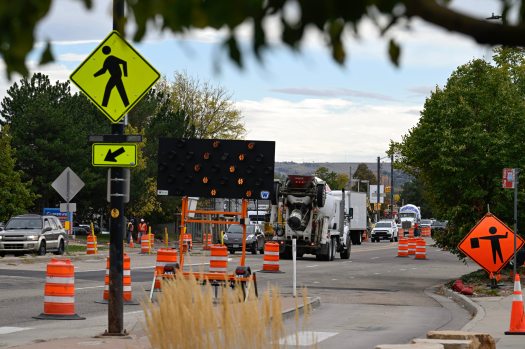Top Stories
Boulder City Council Approves $6.2M Transportation Fee Now

UPDATE: Boulder City Council has just approved a controversial $6.2 million transportation management fee (TMF) aimed at funding essential infrastructure projects. The 6-3 vote took place during a meeting on Thursday, marking a significant moment for the city as it grapples with ongoing transportation needs.
This fee will be imposed on most privately owned properties in Boulder and is expected to generate vital funds for maintenance projects that have long gone unfunded. Councilmembers including Ryan Schuchard, Matt Benjamin, and Mayor Aaron Brockett supported the measure, while members Mark Wallach, Taishya Adams, and Tara Winer opposed it, raising concerns about its impact on local businesses and residents.
The TMF is set to charge non-residential property owners, including private schools and hospitals, between $11 and $160 per 1,000 square feet annually, based on land use categories. Single-family residences will face a fee of $54 annually, while multi-family properties will pay $42 annually. Notably, both the Boulder Valley School District and the University of Colorado Boulder are exempt from the fee, although they may still contribute to a city fund through an agreement.
With around $6.4 million in annual unfunded maintenance needs, city officials stress that the fee is necessary to address critical projects, including pavement management and bridge safety. However, the fee has sparked backlash, particularly from the business community, who argue that it adds to the financial burden as they recover from the impacts of the COVID-19 pandemic.
The council’s decision comes after two prior attempts in the late 2000s and in 2019 to implement a similar fee. Despite the approval, councilmember Matt Benjamin expressed reservations, suggesting the council should delay the decision until early next year to allow for more community outreach. He argued that residents and businesses need a more comprehensive understanding of the fee’s implications.
In a striking statement, Wallach emphasized the need for better engagement, stating,
“To say to them, ‘Come to a public hearing, we’re going to discuss how you get your bills’ is not really what they had in mind.”
His concerns reflect a broader anxiety about how the fee might affect affordable housing and rental prices.
Councilmember Adams echoed these sentiments, asserting that renters might face increased lease prices as landlords adjust to the new fee. “I need us to think about the people,” she said, emphasizing the need for caution in timing and implementation.
The Boulder Chamber of Commerce has also voiced opposition, with Jonathan Singer stating that while some concerns were acknowledged, the economic landscape has drastically changed since the fee was first proposed. He urged the council to seek collaborative funding solutions that consider the economic realities facing local businesses.
As the city moves forward with the TMF, the final reading of the ordinance is anticipated, likely cementing the fee’s implementation. Residents and business owners are left to assess the impacts of this pivotal decision on their finances and the community at large.
Stay tuned for further updates as this story develops.
-

 Business1 week ago
Business1 week agoIconic Sand Dollar Social Club Listed for $3 Million in Folly Beach
-

 Politics1 week ago
Politics1 week agoAfghan Refugee Detained by ICE After Asylum Hearing in New York
-

 Health1 week ago
Health1 week agoPeptilogics Secures $78 Million to Combat Prosthetic Joint Infections
-

 Science1 week ago
Science1 week agoResearchers Achieve Fastest Genome Sequencing in Under Four Hours
-

 Health1 week ago
Health1 week agoResearcher Uncovers Zika Virus Pathway to Placenta Using Nanotubes
-

 Lifestyle1 week ago
Lifestyle1 week agoJump for Good: San Clemente Pier Fundraiser Allows Legal Leaps
-

 World1 week ago
World1 week agoUS Passport Ranks Drop Out of Top 10 for First Time Ever
-

 Entertainment1 week ago
Entertainment1 week agoJennifer Lopez Addresses A-Rod Split in Candid Interview
-

 Business1 week ago
Business1 week agoSan Jose High-Rise Faces Foreclosure Over $182.5 Million Loan
-

 Top Stories6 days ago
Top Stories6 days agoChicago Symphony Orchestra Dazzles with Berlioz Under Mäkelä
-

 World1 week ago
World1 week agoRegional Pilots’ Salaries Surge to Six Figures in 2025
-

 Science1 week ago
Science1 week agoMars Observed: Detailed Imaging Reveals Dust Avalanche Dynamics









